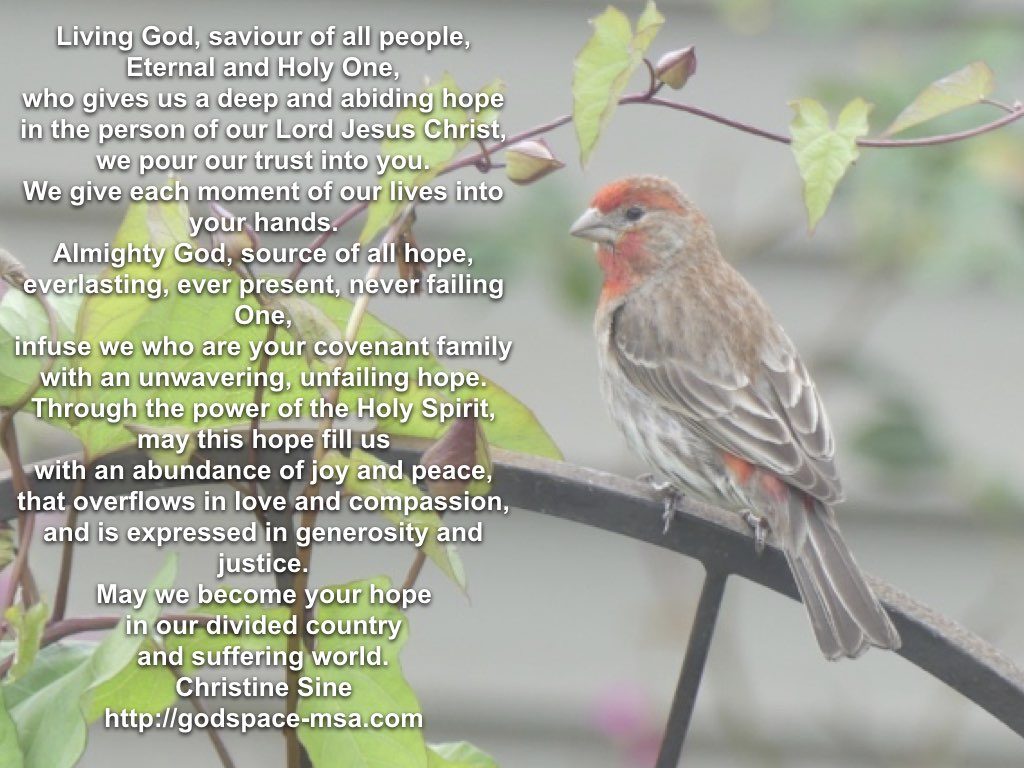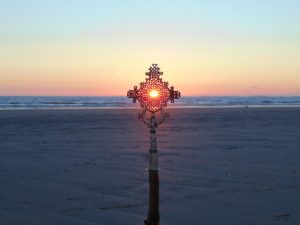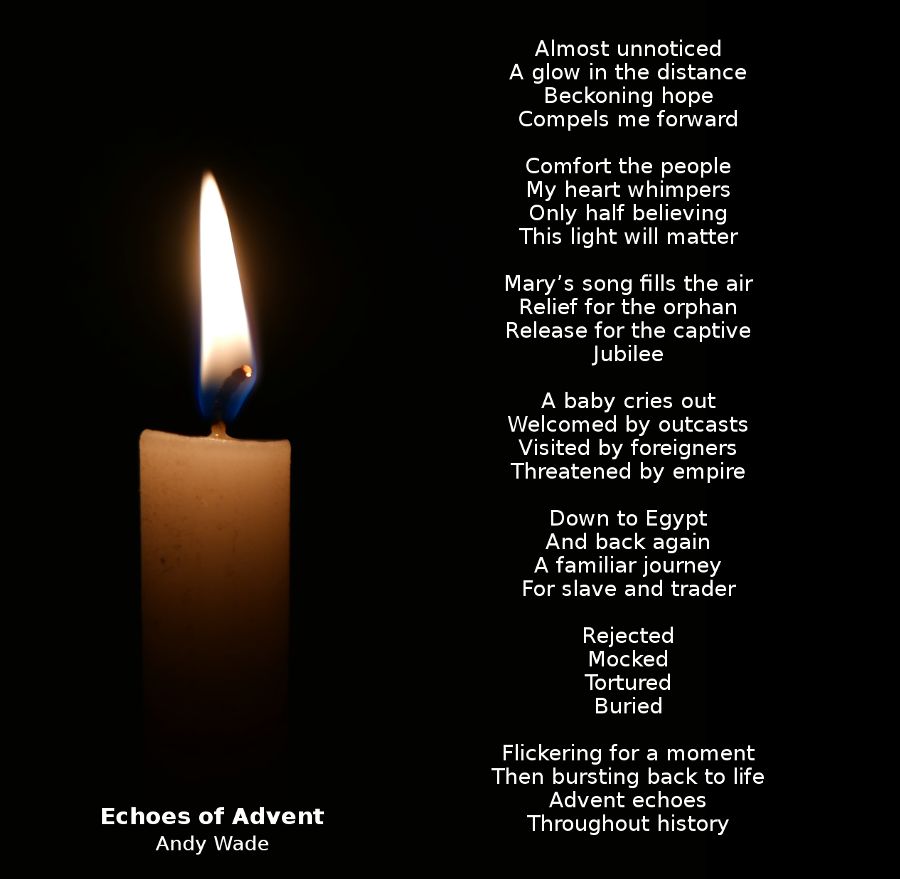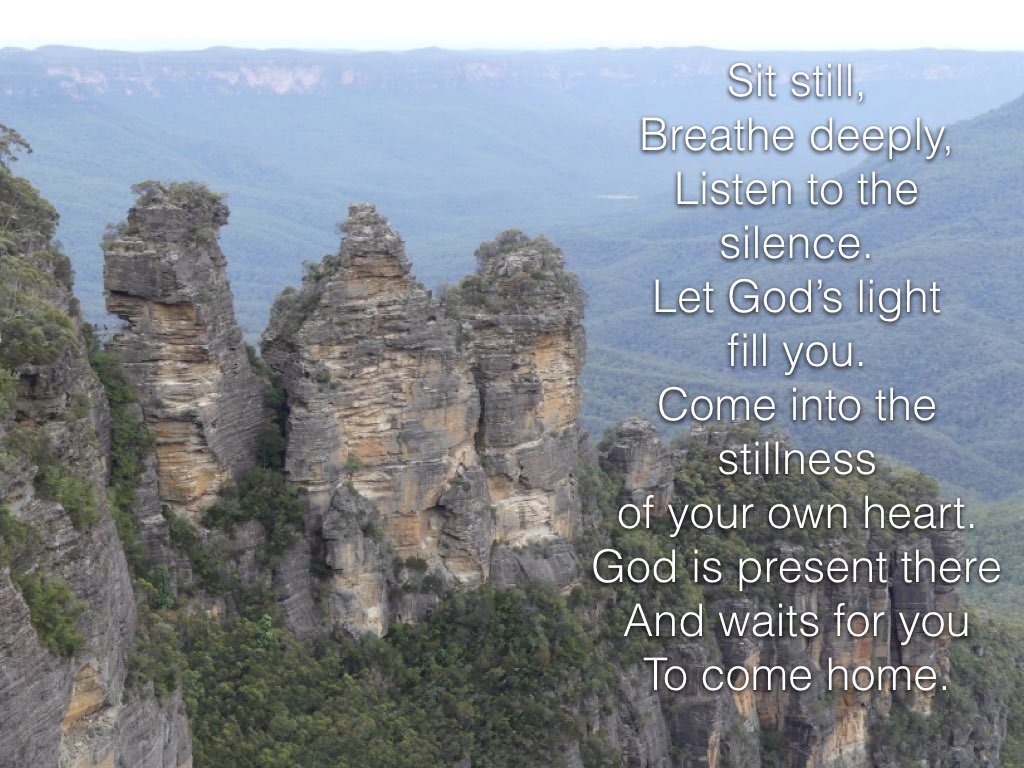by Greg Valerio (Editors Note: This is the second of a series of 3 which was originally posted at the St. Columba Blog and is reposted here with permission.)
The Monastic Church was the earliest indigenous ecclesiology in Britain whose strength and dynamism was its simplicity of prayerful practice alongside a geographically liminal location in the cosmology of Gods created order. In today’s world, the idea of Church is often seen as a distraction to those whose natural tendency is towards contemplation, mystery and wisdom. Similarly the word monastic conjures imaginings of cloistered separation for the spiritual elite, hidden away from the daily lives of the great unwashed. For the executive styled career Christian, platform preachers and church leaders it can quickly become an idol at the heart of the narrative, a means by which we secure material wealth and maintain the gratification of public popularity. It is not the responsibility of human beings to build the church. Not something Jesus ever sanctioned. We must be clear, it is not our job to build the church, this is the purview of God alone. The followers of Christ are called to ‘strive first for the Kingdom and His righteousness, and all these things will be given to you as well’ (Matthew 6:33). The Church is the by-product of this Kingdom focus.
When discussing the reawakening of a British & Irish monastic church I start from the understanding that ecclesiology is not a fixed social, cultural or theological position.The axiomatic passage on church building is of course Jesus’s proclamation over the man Peter, ‘you are Peter, and on this rock I will build my church’ (Matthew 16:18a). What is instantly clear is that Jesus builds the church and that Peter is a human being and not a rock (either in character or temperament). Later in his life St. Peter recalls Jesus’s words, when he speaks of ‘living stones… being built into a spiritual house’ (1 Peter 2:5). St. Paul talks of a body, the Body of Christ (Romans 12:5 & 1 Corinthians 12:12) and bodies are not stone or walls, concepts or ideas, they are are precisely what we live in – namely the skin we are in. The Ekklēsia (called out ones) of God are human beings, physical bodies, being formed in purpose and will to that of God the Creator as revealed in and through Jesus. The authenticity of the Body of Christ should never be about the quality of buildings, organisational political structure, size of congregation or commercial success. These things are helpful, but not defining as they are products of socio-economic conditioning and context. The Body of Christ is only ever to be judged on the quality of the love (John 15:12-17) expressed between the bodies that inhabit it and where those bodies choose to locate themselves. It is as simple as that.
The question then arises what do we do with our bodies and where do we choose to place them? These questions are at the heart of a monastic church ecclesiology. The monastic church is a place that creates the social and creational context in which the individual can be formed in the likeness of Christ. This spiritual formation occurs in three principle ways, through discipleship, imitation and location. So is there an ecclesiology that harnesses the strength of a rooted spirituality, an inclusive communitarian edge and creational harmony?
Discipleship in its simplest terms means to follow after, to learn from and to be taught. We learn by example and clearly for Jesus the call to come ‘follow me’ (John 1:43) was at the very heart of His life’s work. This discipleship however should not be interpreted as primarily evangelistic (if we understand evangelism as a process of converting individual people). Yoder summarises the sociological traits of discipleship as three fold,[1]
- A visible social structure or fellowship (Matthew 10:1-4).
- A sober decision regarding the cost of discipleship (Luke 14:25-33).
- A clearly defined lifestyle that is distinct from the world (Matthew 5:1-14).
Jesus was intentional about the establishing of an alternative society or fellowship that was in direct contrast to the existing system of the world and established governance. During His final meal, Jesus speaks plainly about the essential difference between the kingdoms of the world and the Kingdom of God, being that of servanthood rather than power and control (Luke 22:25). The Kingdom of God is the in breaking of a new social order of love expressed as service and sacrifice, not the revolutionary overturning, or coalescing to, the existing political and social structures of the world.
Monastic disengagement from the start was a social and political statement as well as a theological one. We cannot overlook the vital importance in the fourth century of ‘social meaning’. The presence of heavenly power on earth expressed in the monastic life was closely related to an ascetic stance to ‘this world’ – represented by disentangling oneself from the conventional social and economic obligations in the favour of reshaping of human relations.[2]
This visible counter-cultural community is established in lifestyle, a lifestyle that revolves around the primary commandment, ‘that you love one another as I have loved you’ (John 15:12).
Imitation of Christ is at the very centre of all the monastic traditions and the heart of a Columban ecclesiology and expectation. ‘Be naked in your imitation of Christ and the Evangelists’ (rule 2) is the injunction that follows on from ‘being alone in a separate place’ (rule 1). Imitation is often understood as the copying of Jesus in all aspects of lifestyle and it cannot be denied that this aspirational devotion over the centuries has produced many inspirational exemplars of transformational holiness. What imitation cannot be understood to mean however is that every disciple of Christ should live an identikit lifestyle to Jesus. Jesus was not married, was a carpenter, was itinerant etc. The very fabric of life itself would be out of balance if every Christian copied Jesus in this fashion. If discipleship is an outward expression of an in breaking Kingdom, imitation is the process of inward formation that leads to that out breaking of the Kingdom becoming a material reality (Luke 17:20-21). The imitation of Christ is authenticated in our orientation towards the power structures of the world. Are we transformed (internally and externally) by the authority and values of God or the authority of the world value system? Imitation of Christ is a transformation that leads to the realisation and fulfillment of our true nature. A nature created in the Image of God. Imitation is participation, partaking, abiding, corresponding with the very nature of who God is. ‘Be holy for I am Holy’ (Leviticus 19:2), and ‘be perfect as your Father in heaven is perfect’ (Matthew 5:48) captures the very lifeblood of what it means to be created in the image of God. At this point we must concede failure and our need of grace. No one is perfect in holiness, yet our desire for union with God leads us to climb the ladder of holiness each and every day and when we fall off, start all over again.
Actions without internal concordance swiftly become meaningless religious observance. The heart and soul of our humanity must be liberated from worldly values, so our lifestyle and actions are authentic expressions of our faith (James 2:26). Matthew’s beatitudes, not only focus on external behaviours, they also focus us on the inner world of love, peace, reconciliation, equality, inclusiveness and being free in our hearts from hatred, materialism, revenge, violence, segregation and greed. St. Paul captures a high point of Christian theology when he writes, ‘There is no longer Jew or Greek, there is no longer slave or free, there is no longer male and female; for all of you are one in Christ Jesus (Galatians 3:28).
From the inner world of intentional imitation flows the required detachment from the corrosive worldly values that would have us formed in the image of all that is destructive to humanity and creation.
At the core of discipleship and community is a spirit shaped by Holiness that is free to love without reward or notoriety. The Utopia that is the Kingdom of God is fashioned first in the heart and soul of each follower. St. Columba’s call to imitate Christ and the Evangelists (rule 2), is so we are able to confess with integrity that the ruler of this world ‘has no power over me’ (John 14:30, 19:11).
Location is an indispensable positioning in order to mature in Christ. What is unequivocal in the historical analysis of the British & Irish monastic church was that liminal creation was the physical location for their ecclesial settlements. These liminal wildernesses in turn actively shaped and formed the monastic life in Christ.
God’s indwelling spirit is not merely in humankind or even in animate objects. The Spirit dwells in all things without exception. In that sense the elements such as earth and water are powerful spiritual forces because they have within them the creative energy that is God’s own.[3]
On the monastic island of Iona, St. Columba has a word of fore-knowledge that a pilgrim from Ireland would be blown off course and arrive on the island exhausted and near death. St. Columba instructs one of the monks to wait for the unfortunate to arrive, to take him to one of the monasteries guest rooms, give him hospice until he is fully recovered and able to continue his onward journey. This pilgrim turns out to be a Heron, blown off course in a storm and it is significant the bird is afforded the same hospitality that a human guest would have been (VC 1:48). In this simple prophetic encounter we witness a charismatic creational balance at work in the life of the monastic house.
Those early adherents of British monasticism sought places of creational liminality that afforded the minimal amount of secular distraction and maximised the immanence and transcendence of God in creation. Theirs was a spirituality that embraced wilderness as home.
There can be little doubt that early British and Irish Christians built on the tenants of desert monasticism that included;
- Separation from worldly values of empire
- An embracing of ascetic practices
- A creational worldview
- A focus on an imitation of Christ in all aspects of life.
This indigenous desert in the ocean asceticism was rooted and emerged from within the soil of these islands and uniquely found expression upon the waters that surround them. It recognised that although monastic principles espoused in the Egyptian and Syrian deserts[4] may be inspirational, these principles cannot be imposed from above, they emerge from beneath our feet, from the very soil on which we tread and the waters we sail on.
All of creation proceeds from God, all of creation participates in God, all of creation returns to God – John Scottus Eriugena.
Creation, of which humanity is uniquely a part, is an active participant in our spirituality and ecclesiology, not a passive recipient. To speak of the whole of life as being (w)holy is a theological confession few would disagree with. Yet the challenge comes in living a life that treats all of creation as Holy. To live an intentionally (w)holy life is the most difficult and challenging vocation in today’s aggressively secularised Britain. A privatised modern secularism and liberal economic dogma demand life is structured into manageable monetised and politicised components. This dystopian segregation fails to recognise the primary creational mandate that all of life is sacred and an inter-dependent whole under God. Our spiritual maturity is dependent on a right relationship with creation, and creation needs a (w)holy people to work in partnership to fulfill God’s expectation for salvation.
The final blog article in this series will explore the Columban charism of prayer, work and reading as a way of focusing on the essential practices of the Christian walk.
For a complete copy of Reawakening our Origins, please click on title at the original blog.
[1] John Howard Yoder. Politics of Jesus. (Eerdmans: 1972), p.47
[2] Philip Sheldrake. Spaces for the Sacred. (SCM Press: 2000), p.91-92.
[3] Philip Sheldrake. Living Between Worlds: Place and Journey in Celtic Spirituality. (Darton, Longman & Todd: 1995), p.82.
[4] For a good summary of the theological and spiritual link between desert monasticism of the fourth century and its influence on British and Irish Monastic practice, see chapter 2 of The Church in Early Irish Society, Kathleen Hughes.

by Christine Sine
This has been a very challenging week. The inauguration on Friday of a new president, followed by protest marches across the U.S. and around the world, have had many of us oscillating between despair and hope. My greatest concern is that in the midst of venting our strong feelings we lose the ability to listen to each other and increase the conflict and the divide between us. Hope so easily gives way to despair and faith is replaced by doubt.
Transitions are always uncomfortable. Moving from the familiar through the unknown into something new that has never been seen before brings out all of our insecurities. It often creates turmoil, discord and unrest. Restoring our hope in God at times like this can, however, be a transforming experience.
Finding Hope
On Saturday night we had some good friends over for dinner and Tom asked me to write a prayer on hope for the evening. Hope, I thought, what is there to be hopefully about? So I went looking for hope. I did a search on biblegateway.com of the word hope. First I searched in the New International Version, then in the New Living Translation and finally in The Voice, all of which give different perspectives on the Bible.
Some verses proclaimed where our hope lay – in the eternal God, in Christ our Saviour, in God’s call to be a covenant family and to seek God’s eternal kingdom of love, peace, justice and compassion. Others described hope – never ending, ever present, never failing. By the time I finished my prayer I found that my own emotional state had changed completely. I had regained my hope in God and God’s eternal purposes.
Sharing Hope
What I realized as I wrote this prayer is that hope in God is not an ephemeral, intangible emotion that we can artificially conjure up. First it must be grounded in our trust in God and in what we believe about who God is. Second it must be put into action. The act of writing a prayer and then reciting it out loud with friends was a reviving experience but it is an act that must be followed by concrete action. So this week I am looking for ways to practice my hope in our community .
So my question for all of us today is: Do we have the courage to participate in Jesus’ mission and make his message of hope concrete and tangible in a world where inequality, injustice, and hate seem to reign? Beyond this weekend, how do we intend to practice the kind of hope our faith gives us and bring glimpses of God’s eternal world of justice, equality, love and compassion into being?
A pigeon and I shared morning tea,
Coconut rough and brine of the sea
Our feet rest on yellowed moss over stony cement
I think he talked, or perhaps I dreamt
“see these clouds, this sky, the fountain,
The roads, the houses and there a mountain
…these are connected but you cannot see
These must co-exist in harmony
You affect I and I affect you
In the ways that we go and the things that we do
Some have plenty and some not a lot,
It seems that we ought to share what we’ve got
It is as clear as the water, firm as the ground
Certain as sunrise, at least, I have found.””But pigeon,” I ask, “”What can we do?”
“Next time,” he answered, “You might buy two.”
This post is part of our reflections on the season of Epiphany.
by Andy Wade
I wrote this poem the other day after a couple of weeks of reflecting on these changes of church seasons. Advent to Christmas to Epiphany and on. The promise began long ago, announced its arrival in Mary’s song, and burst into the world surrounded by animals. But that was not the end of the story.
The other day I’d written the draft of a totally different article regarding the theme of Epiphany. It had to do with the gifts of the Magi, and how we could perceive them as being given to “us” today if we looked at them through a different lens. And actually it was turning out okay…until I HAD A REAL EPIPHANY!! The unlikely source of my sudden insight, this sudden revelation “of” myself “to” myself occurred while watching the Golden Globes on television, and listening to Meryl Streep give her profoundly honest and poignant acceptance speech after receiving her Lifetime Achievement Award from the Hollywood Foreign Press.
As she stepped on stage, her remarks began by recognizing the part women have played in helping to change the attitude of the entertainment industry into one of inclusion and acceptance as they took on roles of heft and depth to expose issues that had once been unacceptable for women to express. Many of the “break through” roles were given to women of color, many of whom were in attendance, and to whom she addressed specifically as she looked around the room. From there she went on to point out the various places these women were originally from, and then proceeded to include the male actors as well, noting their roots not only in the United States …but Canada, Europe, Africa, the Middle East and elsewhere. She noted how their experiences of being born in different cultures only prove to enrich our own perspective as we look at common day situations and problems through the eyes of people who are totally different from us, and often culturally respond in ways that seem foreign to us.
From there she recounted her “heartbreak” of seeing a disabled news reporter mocked and derided during a news conference during the pall of last year’s election campaign. It was at this point that she urged the news media to stay resolved to presenting the truth and allowing us all to continue enjoying the privilege of our constitutional right of free speech. She then turned back to her fellow actors and urged them to continue to take on roles and projects that would encourage compassion, which is needed so desperately, especially in the current climate of these times.
At the conclusion of her speech, I told my husband how much I admired her for standing up on that stage and having the courage to speak out her truth not only to her colleagues, but to the millions of people that were watching the program. THAT’S WHEN I HAD MY EPIPHANY!!
Now …this is not a political piece. My point is not to expound on the depth of value I personally found in what Ms. Streep said; even though she was speaking about gender equality, race, acceptance and inclusion of foreigners, and our rights and responsibilities regarding free speech – which are not politic issues …they are quintessentially moral issues! No, the “epiphany” I had was about the lack of courage I display when – unlike Ms. Streep, who got up before God and everyone and made an effort to make constructive comments – I make my comments and share my likes and dislikes on social media, hiding behind the safety of my computer screen where I can be very bold without any direct personal contact! I can say things I wouldn’t ordinarily say person to person, because deep down I hate conflict. I lack the courage to go toe-to-toe with someone who vehemently disagrees with me in person. I like having time to choose my words, time to plan both my defense AND my plan of attack! ATTACK … yes, that’s what this all feels like!!
Case in point: earlier in the day I shared a post on Facebook that, in my opinion, was positive and meaningful. As we headed off to bed after the Golden Globes, I checked my phone and found a “response” to my posting that blasted me for being political, and suggested that I’d better learn to DEAL WITH IT. That the election was OVER and that I needed to GET OVER IT. (btw, this person used these same “all caps.” I think she was shouting at me!). She certainly has her right to express her opinion – just like I do; however, in my heart of hearts, I do not think she would have ever said this to me directly …certainly not in that tone anyway. But her message was received loud and clear! I could feel her hate and disgust oozing from her keyboard. Has anyone ever told you to “get over it” with any real success? Personally, a remark like that makes my claws come out and I dig in even deeper!! Somehow I don’t think this way of resolving an impasse would ever be taught in an “Art of Negotiation” class! We must learn, somehow, to disagree without becoming enemies!
Perhaps the first step is to be more courageous: dare to speak our mind without having an air of superiority that negates the feelings or opinions of others. It seems to me that’s the only way one can get her point across in a manner that just may intrigue the other person enough to look at an issue differently. Always taking a “frontal attack” never accomplishes anything – especially when it comes to our fragile human egos!!
It was at this point I decided to scrap my previous draft and speak to what was more clearly an example of an “epiphany.” There is truly a blessing in the angst of this reality; and I think without the suffering that often accompanies our own complicit role in the problem, we’ll never arrive at the solution.
This post is part of our series of reflections on the season of Epiphany.
by Greg Valerio (Editors Note: This is the first of a series of 3 which was originally posted at the St. Columba Blog and is reposted here with permission. Due to issues that arose from the storms affecting the Pacific NW, this post is going up late today. -Gil George)
BEGINNINGS OF AN EXPLORATION IN BRITISH MONASTIC ECCLESIOLOGY.
COLUMCILLE FECIT.
DELIGHTFUL WOULD IT BE TO ME TO BE IN UCHD AILIUN
ON THE PINNACLE OF A ROCK,
THAT I MIGHT OFTEN SEE THE FACE OF THE OCEAN;
THAT I MIGHT SEE IT’S HEAVING WAVES OVER THE WIDE OCEAN,
WHEN THEY CHANT MUSIC TO THEIR FATHER UPON THE WORLD’S COURSE;
THAT I MIGHT SEE ITS LEVEL SPARKLING STRAND,
IT WOULD BE NO CA– USE OF SORROW;
THAT I MIGHT HEAR THE SONG OF THE WONDERFUL BIRDS, SOURCE OF HAPPINESS;
THAT I MIGHT HEAR THE THUNDER OF THE CROWDING WAVES UPON THE ROCKS;
THAT I MIGHT HEAR THE ROAR BY THE SIDE OF THE CHURCH OF THE SURROUNDING SEA;
THAT I MIGHT SEE ITS NOBLE FLOCK, OVER THE WATERY OCEAN;
THAT I MIGHT SEE THE SEA-MONSTERS, THE GREATEST OF ALL WONDERS;
THAT I MIGHT SEE ITS EBB AND FLOOD IN THEIR CAREER;
THAT MY MYSTICAL NAME MIGHT BE, I SAY, CUL RI ERIN;
THAT CONTRITION MIGHT COME UPON MY HEART UPON LOOKING AT HER;
THAT I MIGHT BEWAIL MY EVILS ALL, THOUGH IT WERE DIFFICULT TO COMPUTE THEM;
THAT I MIGHT BLESS THE LORD WHO CONSERVES ALL,
HEAVEN WITH ITS COUNTLESS BRIGHT ORDERS, LAND, STRAND AND FLOOD;
THAT I MIGHT SEARCH THE BOOKS ALL, THAT WOULD BE GOOD FOR MY SOUL,
AT TIMES KNEELING TO BELOVED HEAVEN, AT TIMES PSALM SINGING;
AT TIMES CONTEMPLATING THE KING OF HEAVEN HOLY THE CHIEF;
AT TIMES AT WORK WITHOUT COMPULSION THIS WOULD BE DELIGHTFUL,
AT TIMES PLUCKING DUILISC FROM THE ROCKS; AT TIMES AT FISHING;
AT TIMES GIVING FOOD TO THE POOR; AT TIMES IN A CARCAIR
THE BEST ADVICE IN THE PRESENCE OF GOD TO ME HAS BEEN VOUCHSAFED.
THE KING WHOSE SERVANT I AM WILL NOT LET ANYTHING DECEIVE ME.
ST. COLUMBA.
For as long as I can remember I have always been drawn to stillness. This does not of course mean I have always been still and as those that know me will testify very rarely quiet. Silence and stillness have over the years become good friends. The longer we walk together the greater an appreciation of their presence and personality I am developing. Silence and stillness are like two ancient spiritual seers, whose call to every generation is to rediscover the Divine Creator in the simple act of listening and holy living. Like many Christians whose introductory experience was predominantly charismatic non-denominational, I have grown to appreciate there is life beyond the noise, ebullient and imminent expectation of a national revival and a resurgence of evangelical social reformers. In and of themselves these expectancies are fine, yet given the increasing flood of political, social and climate chaos the western hegemony finds itself in, I wonder whether they truly are able to deliver on their promise. A chaos the western church is by and large an active economic participant in.
We are of course, all products of our culture, our Godly encounters and our ecclesiology, I am no different. The culture of late 20th, early 21st century Britain has shaped a particular expression of popular churchmanship that in turn has shaped and framed the encounter we have with God. This became apparent to me as I listened to the stories recounted by my daughters and friends, of how their peers were encountering the corporate manifestations of the Holy Spirit during worship gatherings at Soul Survivor.[1] Not a lot would appear to have changed since I attended in the late 1990’s.
The journey from conversion, charismatic encounter, Christ in the poor, contemplative activism to creational wholeness represents a continuum of spiritual peregrination, that when viewed through the eyes of faith is both instructive and life affirming. If this journey is authentic, it has also been spiritually turbulent. Authentic in that it is progressive, I am still in spiritual motion towards my Creator. After all dead people do not move. Life is always in motion, growing, straining, searching for the light. Turbulent as genuine spiritual growth always creates a worldly resistance that must be overcome in our own inner resistance to change (Romans 12:21). The resistance we encounter is always focused on what we prioritise in our lifestyle and the subsequent allegiances we allow ourselves. St. Mark was unequivocal in his assessment of this point in his retelling of the parable of the sower (Mark 4: 1-9).
Having recently completed studies in Celtic Christianity with the University of Wales, I have come to the conviction we can no longer afford the luxury of allowing a justifiable love for Celtic Christianity to remain just that. Celtic Christianity is a wonderful indigenous lens through which we can seek the Kingdom Of God with optimism and hope. Yet perhaps the most pertinent aspect of my studies was the realisation that the British & Irish monastic church must no longer be the sole pursuit of academics, archaeologists, hierophants and historians. Celtic Christianity must now migrate into the hands of the practitioners, the builders, the farmers, the creational activists and spiritual entrepreneurs whose focus is on living a Christian witness that is rooted in the simplicity of prayer, work and reading in this our green and pleasant land.
My purpose is to explore the simple ecclesiology of the indigenous monastic church of Britain. My primary inspiration for this will be St. Columba, the monastic houses that he established, Adomnan’s Life of St. Columba (VC) and the monastic Rule of St. Columba. This Columban charism was archetypal of the British & Irish monastic flourishing between the 5th to 9th centuries. Arriving at its door has been an adventure, a distillation of life experience, creational awakening, a longing for spiritual authenticity and a recognition that the world system cannot deliver on the aspirations that we all feel for a better future for our children, communities and our human longing to find social meaning and purpose.
Arriving at an ecclesiology of the monastic church has been the culmination of numerous factors that have focused heart, mind and spirit on a grounded response to the human, economic and ecological crisis that the world system continues to pursue unabated. I would summarise this worldly obsession as,
- The normalisation of the pursuit of wealth as the ideal human condition.
- Rampant consumerism that has led to an explosion of unsustainable personal debt.
- The alignment of political power with the pursuit of wealth.
- The commodification of land as a resource to be exploited and consumed.
- The impotence of the western Church to demonstrate a cohesive alternative way of life in the face of the world system.
Our acquiescence to the power structures of the world as the defining authority on how we live our lives, has denuded our Christian witness of authenticity and led society as a whole to disregard the church as a cultural artifact. In his essay Racism and the Economy, the Christian agrarian mystic Wendell Berry writes the following,
The great enemy of freedom is the alignment of political power with wealth. This alignment destroys the commonwealth – that is, the natural wealth of localities and the local economies of household, neighbourhood, and community – and so destroys democracy, of which the commonwealth is the foundation and practical means. This is happening – it is happening – because the alignment of wealth and power permits economic value to overturn value of any other kind.[2]
In my 30 years of being a Christian, I have come to the realisation that despite the rhetoric and efforts of well meaning missional groups focusing on confessional conversion, as a body politick, the current western Protestant church is failing in its basic purpose of making disciples and liberating these disciples from the destructive values of the world. ‘You cannot serve God and wealth’ (Matthew 6:24b) is the starkest choice that Jesus presents his followers with. Western orthodoxy has overwhelmingly ignored this basic maxim in favour of a Christianised version of the pursuit of wealth and material comfort. We now have a proliferation of churches, church leaders and church members whose only point of distinction from worldly values is an intellectual confession of faith. We are indistinct from the wider world. This cultural settlement is an anathema to the teachings and life of Jesus.
The next blog in this series of three will explore the characteristics of the Monastic Church.
For a complete copy of Reawakening our Origins, please click on title at the original blog.
[1] Soul Survivor is the largest attended Christian youth gathering in Britain.
[2] Wendell Berry. Racism and the Economy, in, The Art of the Commonplace: The Agrarian Essays of Wendell Berry, (ed.) Norman Wirzba. (Shoemaker & Hoard: 2002), p.58.
I write a lot about our need to sit still, but to be honest, it is not something I am good at. At least that is how I have viewed it in the past. I fidget, I move things. I play with my candles and if I am well enough organized, I knit.
I think my problem is that I have misunderstood the concept of stillness. Stillness does not always mean motionless. It is more of an inner than an outer discipline, an exercise in learning to pay attention to the now rather than the was or the will be. Meditation and mindfulness are the terms often used for this process today. It can be a powerful spiritual tool and one that does not require special space, special skills or special devises to make it happen. We can all find stillness and enter into the presence of God a hundred times a day.
Here are some thoughts on how to accomplish this.
Press the pause button.
Sit comfortably with your feet firmly on the ground. You might like to close your eyes. Take a deep breath and exhale, imagining that you are expelling all your anxieties and pressures with that breath. Come to rest, calm your mind, relax your body.
Notice what is now.
What are you thinking of right now? Hold onto that thought and allow it to become the focus of your attention. For some looking at an object, real or imagined, may enhance the ability to focus. Others may find that activities like doodling, colouring, writing, knitting or whittling bring that thought into greater clarity. Take a few more deep breaths in and out deliberately breathing in your thought into and out of your body.
Enter the place where God waits.
I love to imagine God waits in my heart for me to enter the inner place of soul quietness where my soul and spirit are at peace with the rhythm of God’s breath. And as I enter that place I find myself spontaneously clasping my hands, closing my eyes and bowing my head. It may only last for a few seconds, but in that brief moment there is a deep and profound connection to the living God.
Contemplate what inspires you.
Writing down and meditating on what I hear God say in these quiet moments is one of the most profound spiritual experiences I have on a regular basis. It keeps me grounded in my faith and inspired in my work. It is here that I often write the prayers I share on this blog or start new creative practices for the coming seasons.
Act on what you hear.
It is the prayers and creative practices that come to me during these times that then become the focus for future God moments of stillness and contemplation. I don’t always expect such results from my times of stillness but when they come they are a gift that I receive with gratitude and continue to thank God for as I use and reuse it. Like the prayer above and this one which has come to me in still moments over the last few days.

Calm your mind
As an Amazon Associate, I receive a small amount for purchases made through appropriate links.
Thank you for supporting Godspace in this way.
When referencing or quoting Godspace Light, please be sure to include the Author (Christine Sine unless otherwise noted), the Title of the article or resource, the Source link where appropriate, and ©Godspacelight.com. Thank you!






